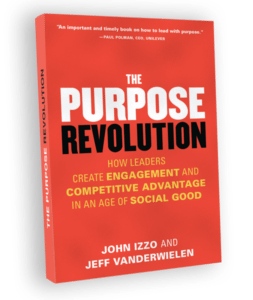John B. Izzo's Blog, page 5
December 2, 2018
How I Met My New Hero – UN Champion For The Earth
A few weeks ago, while speaking at Sustainable Brands Bangkok, I met a man who inspired me so much that I immediately booked a trip to India to spend a week with him. As many of you know, I wrote a book called Stepping Up to show what happens when each of us decides to be the agent of change- not waiting for anyone else to act! If I wrote the book today, he would have a starring role.
Afroz Shah is a constitutional lawyer in Mumbai, India. Though he grew up in Mumbai, he later spent many years away in pursuit of his goals. When he returned a few short years ago, he went back to visit a beach he had played on as a child. He remembered children playing on pure sand and in the ocean on that beach. Yet when he returned, he discovered that the beach of his childhood was covered in five feet of plastic garbage. Yes, literally end to end, five feet high of plastic debris. He was devastated. Not only was the beach of his youth ruined, but he realized that the problem stretched far beyond Mumbai. Plastic in the ocean is a symbol of a species out of touch with the impact of our daily convenience and its consequences for all life on Earth.
But what happened next eventually led to him being named by the United Nations as a Champion for the Earth in 2016. Shah began cleaning up the beach and he also began visiting the homes of people near the beach to invite their participation. He said, “I simply told them what I was doing and asked for their help. No judgment. I simply told them it would be great if you helped me.” The movement grew, and the effort took time, but the beach is now clean and turtles have returned for the first time in many years.
His actions have spurred a movement across India involving thousands, including many school children, who are stepping up for the oceans. Shah has done all of this in his spare time while still practicing law. He told me, “It is amazing what we can do with our two hands when we decide something is ours to solve.”
Wherever he goes, he is never a tourist. The afternoon he and I were both interviewed for a television show in Thailand, he kept saying, “Take me to the garbage” and soon we found ourselves with gloves and bags, picking up plastic garbage and debris from a local river. The locals watched with curiosity as we did our work. Eventually he and I went into a local home where he weaved his simple magic. “When I come back, will you join me?” he asked the family.
These past weeks have been filled with bad news for the Earth. The climate crisis is accelerating. The oceans are choking in garbage. Shah told me, “The problem is we keep our homes clean, we keep ourselves clean, but then we go outside and think this is not my home.” But it is our one collective home.
Those of you who have heard my keynotes on Stepping Up know that taking 100% responsibility changes everything-in business, in our personal life and Afroz Shah is showing that when each of us steps up, it also changes the world.
How will you step up today?
Here are some videos to inspire you. This first video introduces the work of my hero, Afroz Shah.
This second video is an interview with Afroz Shah about how his experiences inspire his environmental work.
The post How I Met My New Hero – UN Champion For The Earth appeared first on Dr John Izzo.
November 12, 2018
Top Three Ways To Make Happiness A Life Discipline
I just spent a day leading twelve CEOs in a session on how to be happier and I want to tell you about it. Two months ago, I got a call from someone who leads a group of high-powered CEOs that meet together monthly. Every year she asks them each individually “What do you want me to hold you accountable to this year?” To her surprise, half of them said, “Ask me if I am happy?” This past weekend in Scottsdale I led a four hour session with those CEOs on How to Be Happier!
As someone who has not only written about leadership but also authored two bestselling books on happiness (The Five Secrets You Must Discover Before You Die & The Five Thieves of Happiness) it didn’t surprise me to hear that these leaders felt they needed to focus on happiness. Most of us, especially successful people, are undisciplined about happiness. We have lots of discipline in our career, work and financial lives but most of us leave happiness up for chance. If I asked most people what their “happiness” plan is, they wouldn’t have a clue.
We have rarely been taught how to nurture and sustain happiness even though there is a great deal of research that shows us how. Each year I give numerous talks on happiness often at large conferences and leadership gatherings.
Here are the Top Three Things I teach top CEOs and organizational leaders about Making Happiness a Life Discipline.
Understand Your Own Happiness
Every day when you find yourself feeling happy be aware of what is happening inside and outside. Start to keep track of it. We can’t replicate what we don’t understand. I play a lot of tennis and my coach is always telling me “Keep staying aware of why you win a point and why you lose it.” By staying aware to what is happening we can make changes. Take a few weeks and keep track of when you feel happy and when you don’t. Ask yourself, “How can I increase the things that bring me happiness and decrease those that make me unhappy?”
Make Sure You Have Happiness Rituals

For years, I have taught organizations to focus on disciplines and everyday rituals that drive culture. These include things like starting meetings with appreciation or reading the mission statement at every stand-up. Our personal happiness is also driven by rituals. Here are two simple ones that work for me as examples. At the end of every day before I go to sleep I ask myself, “What am I grateful for today?” At the beginning of every day I ask, “What am I looking forward to today?” Every day those rituals force me to focus on gratitude and on the days when I don’t know what I am looking forward to, it’s a signal to re-think my day!
Pay Attention To The Happiness Science

In my corporate programs, I help people understand the emerging science of happiness. Research has shown some clear things that drive happiness. Here is one of my favorite findings: Researchers at Harvard wanted to know if there was an amount of time each day that one needed to devote to activities that make you happy. It turned out that as little as twenty minutes a day doing something that makes you happy can change your whole day! To my surprise, many busy people respond to that fact by telling me, “Wow, many days I don’t even have 20-30 minutes devoted to an activity that brings happiness.” Turns out just like vitamins, the key is getting that constant dose every day. One of the things I do is on a day when I am going to be super busy, I ask myself, “Where is my twenty minutes today?”
I really enjoy working with CEOs to cultivate happiness. In fact, being with this recent stellar group of leaders in Scottsdale made me really happy, and set the mood for a buoyant and happy week on my speaking tour.
To get you started on your happiness journey, here is a video from me with some more simple ways to be happier every day.
The post Top Three Ways To Make Happiness A Life Discipline appeared first on Dr John Izzo.
October 8, 2018
How To Define Your Purpose And Face Your Biggest Challenge
I have spent the last two weeks helping two organizations reimagine and define their purpose while coaching another leader to define hers. One of the companies is a startup creating a disruptive innovation and the other is an established business with a long history. In this blog I want to tackle why it matters for organizations and individuals to define their purpose. I’ll also discuss the biggest challenge we all face in defining and naming our purpose.
Why Define Your Purpose?
Naming a clear purpose does three important things. Firstly, it inspires us and others. Time and again I have witnessed the power of a newly named purpose to reinvigorate companies and people. Suddenly our work becomes more than just tasks and we see our effort in terms of service towards a worthy goal. While I can’t name those I am working with, I can tell you that I see the excitement people experience as they begin to identify their highest desires and dream about their maximum contribution in life.
Second, identifying and naming our purpose helps us make decisions. Once we name our purpose it becomes a beacon that guides us in the choices we make. When I went on sabbatical in 2015, I came back with a clear purpose “to help accelerate the shift of consciousness required for humanity to thrive.” Over the last three years that purpose has helped me know when to say yes and, as importantly, when to say NO.
Thirdly, naming our purpose creates alignment. Once we name our purpose it helps people opt in and out of an organization, it serves to bring divergent efforts together in service of a common goal, and it helps align our use of time and resources with our values.
The Biggest Challenge When Naming Your Purpose
Having helped scores of organizations and hundreds of people name their purpose, I have found one big challenge we all face when we decide to take this journey: Playing it Safe.
Organizations and individuals both tend to focus too much on what others will think or the fear that people will say “Who are YOU to try to do that?” When we focus on the fear of looking too ambitious, we create safe statements or corporate speak that offend no one and inspire no one. Imagine if Unilever was not bold enough to make sustainable living commonplace or Starbucks said, “Who are we to inspire the human spirit?”
That fear gripped me when I named my purpose to “accelerate the shift of consciousness required for humanity to thrive!” Who the heck am I to do that? Yet that IS my purpose and naming it has helped those who truly want to work with me find me.
Instead of asking “Who are we?” or “Who am I to that?”, ask a different question: “Why not me, why not us?”
If your purpose doesn’t feel inspiring to you, if it doesn’t feel like a stretch, or if it doesn’t ruffle a few feathers, then maybe you need to pause and reconsider.
The post How To Define Your Purpose And Face Your Biggest Challenge appeared first on Dr John Izzo.
August 8, 2018
New Lessons on Purpose from Harry Chapin, my Hero
People often ask me how I was inspired to create a life of purpose. As someone who has been writing about purpose and helping companies and their leadership find it for twenty years, I define purpose as an “aspirational reason for being that is about making life better now and in the future.” It’s a desire that benefits more than the self. For a company, it’s about wanting more than profit. For an individual, it’s about having deeper desires than pay or ego gratification.
One of my purpose heroes growing up was a singer named Harry Chapin who is most famous for his #1 song Cat’s in the Cradle, about a father too busy to be there for his son. I first saw Harry perform in Greenwich Village when I was sixteen years old, but I saw him about sixty times following that.
I loved his music but that isn’t what made him my hero. Most people don’t know that Harry Chapin performed almost half of his concerts for charitable causes. He often focused on hunger, an issue he cared deeply about. Long before rock stars started doing occasional benefits, Harry gave over nearly HALF of his income away to a variety of causes he chose.
He often said that “when I was young I always ranted that famous people didn’t give more and said if I ever become famous that’s what I will do. When I became successful, then I had to call my own bluff!” I learned from Harry-our purpose is not what we say it is, it’s what we do!
Having a purpose is one thing- many companies and many people have one- but calling your bluff is about really living your purpose when you might choose otherwise. This happened to me when a large tobacco company came to me about helping them with their corporate culture. The pay check would be big, but I’d just spent years saying I would only work for companies that cared about society. I said no.
The opposite happened when a large charity contacted me recently to support an event they were doing to launch support for social businesses. They admitted “we can’t pay you, but we think you can help.” I was very busy- with work that was paying- but I called my own bluff and it was deeply rewarding.
How do you need to call your bluff in your life, your leadership and in your company? If you or your organization were REALLY serious about your purpose, how would you be acting differently?
If you have read this far, I want to share a new offer I am making. Any company that books me to speak, I want to see if I can also do a free session that same day for a charitable organization your organization supports. If you think your organization might be interested I would love to hear from you.
Contact
Name*
First
Last
Email*
Message*CAPTCHA
The post New Lessons on Purpose from Harry Chapin, my Hero appeared first on Dr John Izzo.
May 16, 2018
Three Ways to Find Purpose in Work & Life
All of us want purpose- a reason to get up in the morning that has deep meaning for us. Studies from around the globe show that people who have a sense of purpose live longer and are happier than those who don’t have it. In my most recent book The Purpose Revolution, I show that when people see their work as a calling, they also perform better on almost every metric from performance to engagement. But how do we find more purpose in our work and life?
Today I want to share a few ways we can get connected more connected to our purpose.
First: Notice purpose when it happens
One of the most powerful ways to find more purpose in our work or life is simply to be more attentive to when purpose is present. One of the things I have encouraged people to do for years is to take a few minutes at the end of every work day to ask: What did I do today at work that had purpose for me and gave me a sense of meaning? By taking the time every day to do this simple task we will begin to discover our desires – and what parts of our work make us more present and fulfilled. If, for example, we find that getting out and talking to customers gives a deep sense of purpose, then we need to start making sure we hard wire that task into our schedule. This self-evaluation process also works for coaching others because when we ask employees to identify those moments, it allows us to connect them with their purpose in a meaningful way. But also evaluate and connect with your own life purpose. Ask yourself What activities this week really gave me a sense of purpose?
Second: Ask how you want the room to change when you walk into it
While we often think of purpose as some large, overarching mission in our work or life, many times we discover purpose in the small ways. One of my favorite coaching questions for purpose is to ask people: How do you want the room to be different every time you walk in? A few years ago, I asked a receptionist in a law firm and she said, “Whenever I walk into a room I want people to feel optimism and positivity.” She began to realize she could live her purpose every day just by intentionally being positive and creating meaningful interactions in every encounter. For me, I want people to feel challenged to take their life and work to a new level, which means that I can live that purpose by writing books and giving keynotes, but I can also live it sitting next to a stranger on an airplane or encouraging a tennis opponent who is new to the game.
Third: Don’t be afraid of the BIG Questions
Whenever I do keynotes or workshops on purpose or engagement inside a company I often put out this challenge: If you can’t live your purpose in the role you are in right now, then you owe it to your life to either find a place you can live that purpose or to find a way to live it where you are. I am always daunted by the positive response I get to this simple challenge. Many of us come to accept a low level of purpose in our work- after all, it is just a “job.”
But the stakes are way too high to work or live without purpose. A few years ago, I did a series of sessions for call center team members at a large bank. After working with over a thousand associates, the leader told me that six people had quit within 45 days of my talk. When I started to apologize, she stopped me saying: “Please don’t apologize, they were the right people, people who realized they could never be at their best in the role they were in- so it was good for them and good for us.”
Life is too short not to have a deep sense of purpose. If your life or work does not hold purpose for you now, then don’t be afraid of those big questions: Is this company or this role aligned with my purpose? Is there another calling that beckons me? How can I take a step of courage, however small, to move towards that purpose?
Of course, my new book The Purpose Revolution is chock full of exercises and activities that will help you find more purpose and coach it in others. For now, start with these three simple steps.
The post Three Ways to Find Purpose in Work & Life appeared first on Dr John Izzo.
April 20, 2018
Are Your Employees Your Best Ambassadors?
Our employees are our most important ambassadors for our organization. How they talk about us often determines our reputation both with customers and potential future employees. While only 16% of people say they trust what a company says about itself in advertising and social media, over 70% of people say they trust what your employees say about your company. In fact, a social media comment about your organization is up to ten times more likely to be shared if it comes from an employee rather than the business itself. Getting employees to truly be your best ambassadors is one of the issues we explore in our new book The Purpose Revolution, a concept we call Branding from the Inside Out
I recently did a video you can watch that both tells you why it matters to get your employees speaking positively about you and how to get them to do it! You can watch the video here.
We have a simple formula for creating great Internal Brand Ambassadors. We call it: Ask, Enable & Empower
Ask: Are your people proud of your organization, believe in your purpose and speak positively about it ALL the time? If you don’t know the answer to that question, then ASK them! One of the things we encourage organizations to do is to measure whether team members are proud of your company (and its products and services). So, ask and then address any issues that are hindering them being positive about your purpose.
Wise leaders are consistently giving team members information to help them be great ambassadors. This means a constant diet of good news stories about the difference you are making for society and your customers. One banking client of ours consistently shares this information with managers to share with teams. Make sure every meeting includes positive stories and facts about how your company is making a difference.
Empower. Finally, empower your people to tell your story to the world by ASKING them to do so. Encourage them to use social media and their personal voice to tell the world that your company cares about customers, society and planet. I am amazed how many companies and leaders NEVER ask their employees to make this a priority. Share with them the fact that 70% say their believe an employee while only 16% believe company communications and that their shares are 10X more likely to be passed along. And don’t tell them they have to pass their sharing through internal communications channels-trust them, they won’t disappoint you.
When Cisco wanted to tell prospective employees why they would love working for CISCO, CEO John Chambers offered to buy a video camera for any team member who would tell the story of why “they chose Cisco” in a you tube video. They didn’t have to get their videos approved by the company. It lead to millions of views from real life employees convincingly telling the world why they chose Cisco.
Watch the video blog
The post Are Your Employees Your Best Ambassadors? appeared first on Dr John Izzo.
February 14, 2018
The Purpose Gap
What is the Purpose Gap? It is both an opportunity and threat in the business world today. It exists because there a distinct difference between what people desire and hope for, and what is actually being delivered by businesses and organizations. Today a purpose gap exists for both employees and customers.
Seventy seven percent of employees say there is matters a great deal to work for a company they believe in and a job where they have a sense of purpose. Fifty percent of Millennials would take a pay cut to work for the right company, and almost forty percent cite purpose as the main driver of their engagement and retention at work. Yet the vast majority of people, 75%, say that they don’t work for this type of company- that the company they work for mostly cares about profit and its own self-interest. Therein lies the purpose gap for employees.
Customers around the world are asking for more purpose than companies are delivering. Eighty percent of customers globally want to buy from companies that they believe are doing a good job in the world. Yet they feel confident that only 6% of the companies they do business with are actually good. In other words, they have a deep desire to buy good, but have no idea if the companies that serve them are good or not. There are good companies out there, and a lot of work needs to be done by companies to tell their authentic story and build a firm relationship with customers based on who the company is, and what positive good it achieves.
My co-author Jeff Vanderwielen and I talk in The Purpose Revolution about how companies who close the purpose gap are going to be the real winners. As employees and customers, we want more. The companies who listen and really deliver are going to be the ones we choose to work for and buy from. The Purpose Revolution is here. Are you ready? Watch my Izzo on Purpose video to find out more about The Purpose Gap.
The post The Purpose Gap appeared first on Dr John Izzo.
January 6, 2018
The Uber Purpose Mess
Companies with integrity and strong values rely on the goodwill of their purpose and the exceptional performance of their employees and management at all levels in order to succeed. They also know that when things go badly, a small number of people can adversely impact sales and profits. So what happens when a company such as Uber gets into a royal disaster and finds itself on the wrong side of the purpose-driven customer and employee? How do Uber get into this mess, and how would I advise them to take corrective action?
As you probably heard, whistle blowers say Uber made a series of ethical lapses in many different areas. To name just a few of the transgressions reported: claims of sexual harassment at the highest level, discrimination claims, allegations of spying on their own drivers to find out if they were driving for other companies, tying up their competitors’ drivers by making bogus requests for rides so the competing drivers were busy and unable to service real clients, using a software called Greyball that would trick the regulators and allow Uber to drive where they were not legally allowed, and the almighty hacking cover up where several hundred thousand customers’ accounts were hacked and Uber chose to pay the hackers to delete the data– and blindly trust the hackers actually did, instead of going public like the vast majority of ethical companies do.
So after a company has burnt its reputation with customers and employees, what next? Number one, you’ve got to be honest about what’s happened and you can’t mince words. Uber, you’ve got to admit you messed up, that you had a culture of arrogance, of deceit, of acting above the law, and not thinking about the best interests of stakeholders. Announce that it’s going to stop, and it’s going to stop now. The CEO has been doing a kind of repair tour this fall, but I believe it hasn’t had the strong language and authentic apology that is required in these situations.
The second thing is you’ve got to win your employees’ trust back. It’s interesting that customers only believe about 16% of what companies say about themselves. So for all the effort Uber takes in running ads and a damage control tour, until you win those drivers and employees, you’re in trouble. Why? Because even though there’s only 16% believability about what the company says about itself, there is 63% believability when an employee talks about what happens behind the scenes. So if a driver reports they like Uber, that its leadership has taken steps to be back on the right side, people will listen. And I can tell you just in the last few weeks I’ve heard Uber drivers criticizing the company, saying they can’t stand the organization, that they’re not treated well. So Uber needs to have an internal campaign to really win the hearts and minds of their drivers again. To further stress the importance of winning employees, recent statistics show people are ten times more likely to share a social media feed from an employee than they are from the company. So Uber, go apologize, then really go inside and win the internal stakeholders, so they can go win your market share back.
The third thing is, be really clear on the set of commitments you’re going to make. I would encourage Uber or any company that finds itself in this situation to identify five to seven commitments to make to customers and to drivers going forward. Makes these are commitments and keep them, so you can begin to truly win people’s trust again.
I’d love to hear what you think about the Uber mess. Please watch this Izzo on Purpose video and tell me: Are you boycotting them? Are you still using them? Do you care? Don’t you care? What would you do or advise if you know a company that’s gone offside in The Purpose Revolution? So please, love to hear from you and please get involved in the conversation. The Purpose Revolution is upon us and the only question is, are you and your company going to be winners or losers?
The post The Uber Purpose Mess appeared first on Dr John Izzo.
January 2, 2018
Does A Company’s Purpose Change or Evolve Over Time?
Many people will contend that a company’s purpose is static and enduring. They say once you have a purpose it never changes, but I strongly disagree. If your company’s purpose doesn’t evolve and change you could be in big trouble.
It is common for people to confuse purpose with values. Now our values often don’t change over time, and if you look at many of the successful companies across multiple generations, you’ll find they often have a set of core values that continue to serve them very well.
What we need to realize is that our purpose is the intersection between our values and what the world needs right now. So our purpose must always change and evolve.
Join me as I discuss the topic of a how a company’s purpose should change over time in this Izzo On Purpose video.We’ll hit on some examples of successful companies that have made the shift, and one that didn’t. The Purpose Revolution is upon us. Are you ready for it?
The post Does A Company’s Purpose Change or Evolve Over Time? appeared first on Dr John Izzo.
December 31, 2017
How I Start My Year
 I’m sharing my January routine with you with the hope that it will bring you success through creating intention and momentum in a mindful way.
I’m sharing my January routine with you with the hope that it will bring you success through creating intention and momentum in a mindful way.
First, I reflect on all the things I am grateful for from the year passing, both small and large. I refuse to focus on deficits or problems but only things I am grateful for. This both puts me in a place of happiness but also reminds me what I want to create more of.
If hard things have happened, I focus on the parts of those experiences I’m grateful for. My mom died this past year. Losing her was very hard but I’m so grateful I got to spend her last week by her side, that I got to witness her quiet strength facing death, that I learned so much through her transition from life to death. Most of all, I got to hold her as she took her final breath.
After I am complete meditating on gratitude, I reflect on my intentions for the year ahead. Intentions set a direction of where I want to focus. I don’t make resolutions or goals because both are punishing and limiting.
Resolutions are promises waiting to be broken because they tend to be yes or no propositions. Research shows the average resolution is given up within 48 hours. Goals are also limiting because they often focus on something measurable like “grow my business ten percent” or “lose fifteen pounds.” It’s hard to know if these numbers are achievable or even worse, too small.
Here are some real examples of intention. One of my intentions in 2018 is “to give back more.” I can’t be sure all the ways I can do that in 2018, but by keeping that intention in front of me (and revisiting it weekly) I find I navigate towards action. I also have an intention to “actively and consistently promote the message of my two new books in 2018.”
I could have set a goal to sell a certain number of books but I can’t control how many people read my books! But I can control my own action by consistently doing my best to spread the important ideas in The Five Thieves of Happiness and The Purpose Revolution because I think those ideas can help individuals, companies and society.
I try to keep my intentions to 6-10 and then I review then briefly once per week and more thoroughly once per month to check progress.
Hopefully this helps and I hope some of you might do the same and tell me how it goes. If you want my list of intentions for 2018 send me a note and we will send them along.
I wish you and our world a blessed 2018.
John
The post How I Start My Year appeared first on Dr John Izzo.










